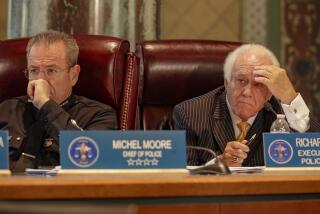To crack down on tee time brokers, L.A. golf courses will require $10 deposit

- Share via
Officials with the city of Los Angeles have approved a new measure to crack down on brokers who resell tee times at public golf courses: a non-refundable deposit.
The L.A. Board of Recreation and Park Commissioners — a five-member panel appointed by Mayor Karen Bass — unanimously approved on Thursday a “pilot program” in which each golfer will be charged $10 to reserve a tee time, with a foursome costing a total of $40.
The $10 will be credited toward a golfer’s greens fee.
For example, if a golfer typically paid a $35 greens fee at one of L.A.’s public courses, it would cost $10 to reserve their spot in advance. At check-in for the tee time, the golfer would pay the remainder, $25.
Those who cancel their tee time would not get a refund. And if a golfer fails to show up for their reservation, an additional $10 no-show penalty will be levied.
The new pilot program also requires using a credit card to secure a reservation — an added layer of verification.
Rick Reinschmidt, the head of L.A.’s municipal golf division, said at the parks commission meeting that the nonrefundable deposit would cut down on brokering by “significantly cutting into a broker’s profit.” Some brokers scoop up tee times, then later cancel and rebook them under their paying customer’s name.
The confirmation of long-held suspicions has roiled the L.A. golf world, with players clamoring for the city to crack down.
With the deposit, Reinschmidt said, brokers would be forfeiting $40 for every foursome they canceled in order to execute a resale.
“We understand that this alone is not the silver bullet, but we strongly feel that this action will help deter brokering,” Reinschmidt said at the meeting.
The new pricing system comes after weeks of criticism from local golfers, community members, golf influencers on social media, and The Times’ editorial board over the prevalence of a black market in tee times.
A network of brokers, many in the Korean community, have managed to scoop up coveted times, particularly for popular city-run courses in Griffith Park and Rancho Park, and sell these slots for a fee.
One broker told The Times that he makes a couple thousand dollars a month selling tee times for L.A. city golf courses and other public courses across Southern California.
A prominent Korean American golf club asked L.A. officials to stop the black market in tee times. Now it is suing the city over its inaction and filed a sweeping class-action lawsuit alleging a breach of public trust.
Dave Fink, a golf teaching pro with more than 200,000 followers on Instagram, kicked off a wave of awareness last month when he posted screenshots of brokers’ tee sheets listing available times and fees. Fink’s #FreeTheTee videos went viral among golfers, who’ve struggled to book slots on city courses and said they’d complained repeatedly to Reinschmidt and others.
“This is an issue that affects everybody who pays taxes in the city, and anybody who plays golf as well, so I just felt like it was my duty to say something,” Fink told The Times.
At the meeting, Reinschmidt said “the brokering and reselling of tee times is not a new issue and not unique to the city of L.A.’s golf courses.”
He highlighted some measures taken by his department, including suspending 151 user accounts and implementing enhanced security measures to cut down on the use of bots and other software to book precious tee times.
None of the city commissioners pressed staff at the Department of Recreation and Parks as to why the $10 deposit program was not introduced earlier. Reinschmidt pointed out that other cities have nonrefundable fees, including New York ($5), San Francisco ($15) and Pasadena ($4.95). Unlike L.A.’s pilot program, the other cities do not credit their booking fee toward a player’s greens fee.
Some golfers welcomed the reform. But Stephen Berens, an Eagle Rock resident who has golfed on city courses since 1990, said the deposit system doesn’t get to the heart of how brokers secure favorable tee times.
“They are doing something so that it looks like they are solving the problem, but it actually makes it more difficult for golfers to get a good tee time,” said Berens, who golfs about once a week but logs on to the city’s reservation system multiple times a day.
Each week, he attempts to get a morning tee time at Griffith Park but rarely sees anything earlier than 2 p.m. He usually books a foursome elsewhere, such as Woodley Lakes, while continuing to refresh the site in hopes of landing something better.
Under the new system, he’d have to pay another $40 to cancel his Woodley Lakes reservation and book his preferred slot.
“With the new system, you can’t move course to course. I can only improve my time at Woodley,” Berens said.
The city needs to figure out how tee time reservation system is being gamed, and fix it. This public amenity must be as accessible as possible to all.
Deputy Mayor Jacqueline Hamilton conveyed Mayor Karen Bass’ support for the new reservation fee and expressed appreciation that city staff moved “very quickly” with the pilot program.
“We ... are looking forward to the results of this and other measures that are being planned,” Hamilton said, “so that we can address [tee time brokering] and make sure that the residents of Los Angeles are able to make use of this public resource.”
The “pilot program” has no sunset date, and it appeared to be active as of Thursday afternoon, with the reservation system requiring a $10-a-person fee, payable via credit card.
Matthew Rudnick, executive officer of the Department of Recreation and Parks, said Thursday at the commission meeting that the nonrefundable deposit, along with other unspecified measures to crack down on brokering, would be discussed at future meetings.
“We’ll probably be giving regular updates to the board on this topic,” he said.
More to Read
Sign up for Essential California
The most important California stories and recommendations in your inbox every morning.
You may occasionally receive promotional content from the Los Angeles Times.














